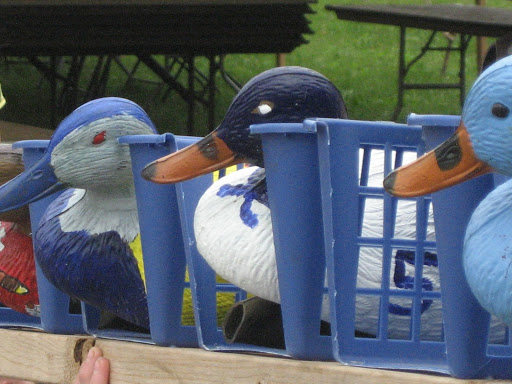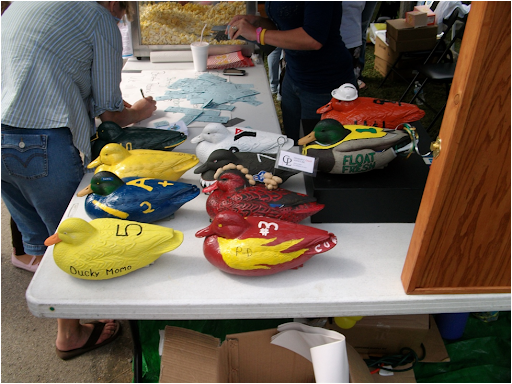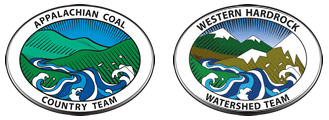Based on the work of
Lackawanna River Corridor Association
Northeast Pennsylvania
Lackawanna River Corridor Association (LRCA) established an entertaining fundraiser to connect their organization with the community by holding a different type of duck race. Instead of wrangling hundreds of tiny rubber ducks, LRCA’s fundraiser uses 10 large hunting decoy ducks that were decorated by local schools before the race. Tickets were sold to the public with the last digit of their ticket number corresponding to one of the ducks. Prize winners were drawn from the ticket number pools corresponding to the first, second and third place ducks. The tasks involved in planning and executing the duck race are also senior-friendly, such as recruiting sponsors to paint each duck and selling tickets.

Tested by
Redbank Watershed Association
Western Pennsylvania
Redbank Watershed Association (RWA) wanted to hold a duck race to push their young organization to reach out to the community and try something new. This trial practice was eagerly chosen by RWA members due to its high level of fun and the potential for community involvement. RWA formed an enthusiastic committee that participated in the process of obtaining the duck decoys and collaborating with local partners. They coordinated with local businesses to donate raffle prizes to supplement the cash prizes that were given out for the first, second and third place ducks. One RWA member constructed a “duck release gate” to simultaneously launch the ducks at the beginning of the race. RWA successfully held their first duck race during the 2010 New Bethlehem Peanut Butter Festival organized by the Borough of New Bethlehem. The large duck decoys were more beneficial than smaller rubber ducks because the duck decoys were each painted by the sponsor of that duck. RWA sold numbered tickets with the last digit (1-10) corresponding with a duck. First, second and third place winners were drawn from the pool of raffle tickets corresponding to the winning ducks. For example, duck #10 won RWA’s race, so first prize was drawn from a pool containing any ticket ending with 0 (10, 40, 130, etc).
Tested by
Crooked Creek Watershed Association
Western Pennsylvania
Crooked Creek Watershed Association (CrCWA) wanted to host a duck race as a fun and interactive event that could be held during the group’s annual Fish Fry picnic. The Annual Fish Fry Picnic has been hosted by CrCWA since 1985 and they hoped a duck race would attract younger individuals to their organization. The duck race seemed like a cohesive and inexpensive addition to their already successful fish fry event. During the planning stages of this trial practice, CrCWA found it difficult to recruit volunteers to help plan or hold the event. They also found that several other local organizations hold duck races. CrCWA and Redbank Watershed Association (RWA) are located in the same county and draw supporters from the same general community. RWA’s duck race was their first major fundraising event, while CrCWA already had an established annual fundraiser. Repetition of this event would conflict with RWA’s event, which didn’t align with CrCWA’s goals for the area. Due to conflicts of interest with other organizations holding duck races, CrCWA did not hold a duck race. CrCWA’s 25th Annual Fish Fry already had a canoe, rod and reel, and dollar raffle in place. CrCWA decided that the time and effort of holding a duck race would not bring in enough additional income to make it a worthwhile undertaking.

“The group has really taken charge of the activity. This is one of the group’s first major projects and it has been taken on with such excitement. This is a fun, easy practice that can be a success for most any group.”
– Redbank Watershed Association
